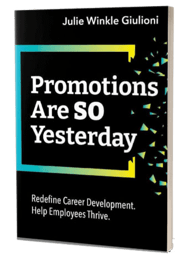The Many Languages of Career Development – Guest Blogger Julie Winkle Giulioni

We’ve all heard of the 5 Love Languages… right? But how many career development languages do you know? If you’re like many, the answer is just one: Promotions!
But in most organizations, the time-honored tradition of defining career development in terms of promotions, moves, and/or title changes is dying or altogether dead. Hierarchies are flattening. Job bands are broadening. Work is more organic, organized around evolving needs versus entrenched structures. When opportunities do finally present themselves, competition is stiffer as remote work has removed the previous geographic limitations of who was within a reasonable commute to the workplace.
Logically we all know that the opportunity to grow by moving to a new role is inherently limited. Yet we can’t help but continue to measure success against the artificial (and elusive) yardstick of the promotion.
It’s time to finally recognize that the language of climbing the corporate ladder is just one of the dialects of career development – and like Latin, for many it’s becoming a dying language. Leaders who are willing to become more fluent in this area will be able to have richer conversations that drive greater employee satisfaction, engagement, retention, and the results organizations so desperately need.
7 C's of Employee Growth and Development
Want to migrate from a monolingual to multilingual approach to helping others grow? Put promotions aside for a moment and consider these alternative languages that facilitate deep and doable development in today’s workplace.
- Contribution: While not a language of development that comes to mind immediately for many, contribution taps our deeply human need to add value, make a difference, be of service, and live on purpose. When it’s used for development, it’s a win-win for the organization and the individual. And what might be surprising is that the research I conducted for my new book, Promotions Are So Yesterday, found that in aggregate, employees are more interested in growing this dimension than any others – including promotions, positions and moves.
- Competence: This is a more familiar language of development. It boils down to working with employees to intentionally develop the skills, knowledge and capabilities that are needed to enjoy greater effectiveness and satisfaction today, but also to future-proof their careers for tomorrow.
- Connection: There’s that expression, “it's not what you know but who, you know,” and that certainly applies in part when it comes to career development. Connection is fundamentally about the growth that can come from expanding and deepening social networks, building productive, meaningful relationships, enhancing visibility, and creating a sense of community.
- Confidence: Frequently overlooked, confidence is a profound development dimension. Anyone who has ever experienced imposter syndrome (and that would be about 70% of us over the course of our careers) knows that lack of confidence can impose an invisible ceiling on success. Leaders who are fluent in this language can help people grow by building that sense of trust and assurance in their ability to perform predictably and with ease.
- Challenge: This is a development language that many leaders and employees already speak well. When you help people step up, step out, and step into new situations that stretch them beyond what they know and can do today, you usher them into the discomfort zone where learning and growth accelerate.
- Contentment: The idea of contentment might seem like a foreign language to leaders looking to develop others; but it’s being spoken by more employees today than ever before. Only amplified over the past two years, people are re-evaluating their priorities and their relationship to work. They’re looking for greater meaning, satisfaction, ease, and balance. And when they can work with leaders to find these things, there are tremendous possibilities for development as well as retention.
- Choice: One of the three fundamental psychological needs we bring to the workplace, autonomy has become a pressing workplace issue. People crave greater control and independence. They want to make meaningful choices about their jobs – the how, when, and where of it. In fact, a recent Mercer study finds that one out of three employees would swap higher pay for a fully flexible work schedule. Exercising this kind of choice and decision-making is filled with opportunities for learning and growth.
These languages of development have two important things in common. First, unlike promotions, positions and moves, these are completely within the control of managers and employees who can choose to take action and enable growth right within one’s current role – in the here and now. And second, my research found that in aggregate, employees find each of these languages more interesting than climbing the corporate ladder.
Any new language opens new doors and opportunities. And mastering these languages of development accomplishes the same thing for leaders as they translate the old definition of career development and introduce a whole new vocabulary around growth. So, it’s time to cultivate greater fluency with career development by leveraging all of the available languages – and the results will speak for themselves.
Win Free Copies of Promotions Are So Yesterday
Julie Winkle Giulioni has generously offered to give 5 of our readers a complimentary copy of Promotions Are So Yesterday. To win, simply be one of the first 5 people to comment on this blog.
Otherwise, to learn more about Promotions Are So Yesterday and pre-order your copy – and request an exclusive bonus chapter, Multidimensional Career Development: Your Coaching Role – click here today!

Julie Winkle Giulioni is a champion for workplace growth and development and helps leaders optimize talent and potential within their organizations. Named one of Inc. Magazine’s top 100 leadership speakers, she’s the co-author of the international bestseller, Help Them Grow or Watch Them Go and author of Promotions Are So Yesterday (publishing by ATD Press on March 8, 2022). Julie is a regular contributor to numerous business publications.

Comments on this post